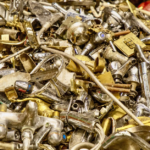When it comes to recycling metals, brass scrap plays an essential role in reducing waste, conserving resources, and supporting the economy. Brass, a versatile and durable alloy primarily composed of copper and zinc, is widely used in various industries for products such as pipes, fittings, hardware, and even musical instruments. However, like all metals, brass can lose its value over time or become obsolete, making it perfect for recycling. This is where brass scrap buyers come into the picture.
What is Brass Scrap?
Brass scrap refers to any discarded or unused material made from brass, whether it’s from industrial production, manufacturing, or everyday use. Brass scrap can come in many forms, such as old pipes, fittings, rods, sheets, or even discarded brass jewelry. Since brass is a valuable material, it’s often sold to recycling companies or scrap buyers to be melted down and repurposed into new products. Brass scrap is prized for its high copper content, which makes it valuable to both buyers and sellers.
Why Brass Scrap Buyers Matter
Brass scrap buyers play a crucial role in the recycling process. They act as intermediaries between individuals, businesses, and recycling centers. They buy brass scrap, often from various sources such as construction projects, demolition sites, or even household scrap, and then resell it to smelting plants or manufacturers. By purchasing brass scrap, these buyers help keep the recycling process moving and ensure that the material is repurposed instead of sitting in landfills.
How Brass Scrap Buyers Determine Pricing
One of the key factors that brass scrap buyers consider is the quality and grade of the brass. The more copper in the alloy, the higher the scrap’s value. There are different grades of brass scrap, each with its own price point. Some of the most common types include:
- Red Brass – Known for its high copper content, red brass is often considered the most valuable.
- Yellow Brass – Contains a mix of copper, zinc, and sometimes small amounts of other metals like tin or lead.
- Brass Turnings – Small shavings or chips of brass from industrial machines.
- Brass Plumbing Parts – Scraps from old faucets, pipes, or plumbing systems.
The price of brass scrap fluctuates based on the current market value of copper, demand for recycled materials, and supply levels. Scrap buyers also assess the cleanliness and size of the scrap; contaminated or mixed metals can lower the value of brass scrap.
How to Sell Brass Scrap
If you’re looking to sell brass scrap, there are several steps you can follow to get the best price:
- Sort and Clean – Separate the brass from other metals and clean it of any non-metal components like plastic, rubber, or paint. Clean brass typically commands higher prices.
- Weigh the Scrap – Brass is priced by weight, so you’ll need to know the total amount of scrap you have.
- Research Buyers – Look for reputable brass scrap buyers or recycling centers in your area. Compare prices to ensure you’re getting a fair deal.
- Negotiate – Don’t be afraid to negotiate the price, especially if you have a large amount of scrap to sell.
Many scrap yards offer cash on the spot, which makes selling brass scrap a convenient option for individuals and businesses alike.
Environmental Impact of Brass Recycling
Recycling brass scrap is incredibly beneficial for the environment. Brass, like other metals, requires a significant amount of energy to mine and refine. By recycling brass, the energy consumption is reduced, which in turn helps lower carbon emissions. Additionally, recycling brass helps conserve natural resources by ensuring that fewer raw materials are needed to create new brass products.
Brass scrap buyers help promote sustainable practices by encouraging the recycling of valuable materials, making it possible to reuse the alloy rather than extract new raw copper and zinc from the Earth.
Conclusion
Brass scrap buyers play an essential role in the recycling ecosystem by helping to turn discarded brass materials into valuable resources for manufacturing. By offering a convenient avenue for individuals and businesses to sell brass scrap, these buyers contribute to a more sustainable and efficient recycling process. Whether you’re a homeowner cleaning out old plumbing fixtures or a business with large-scale industrial scrap, knowing how to properly sell your brass scrap can ensure that it finds its way to a second life, benefiting both the economy and the environment.

